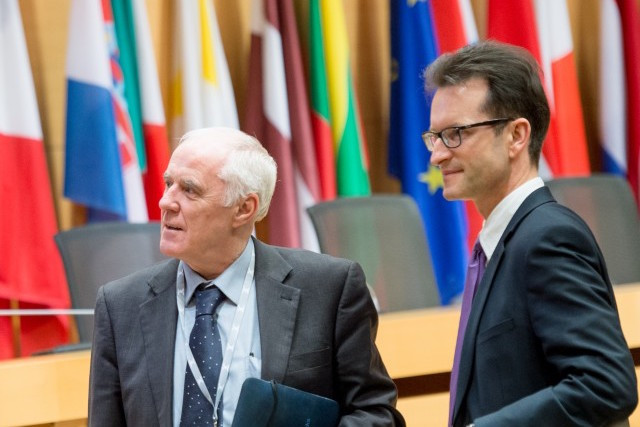Carpenter spoke with Delano on Tuesday, the day after the working lunch between European Commission president Jean-Claude Juncker and British prime minister Theresa May ended with no results on the three “divorce” issues (citizens’ rights, financial settlement, and the border question between Ireland/Northern Ireland).
After it looked like an agreement could finally be reached on Monday 4 December, Juncker announced there were still two or three outstanding issues that were still up for discussion. Most media, however, focused on the issue of the Irish border, and the wording of the “regulatory alignment” of Northern Ireland with the EU, which had caused the DUP leader Arlene Foster to issue a statement that her party could not agree to this. May depends on the support of the DUP for a parliamentary majority.
Carpenter said in his 5 December interview with Delano:
“We had expected that we would have an agreement yesterday, but we are disappointed that it was impossible.”
The Irish ambassador explained that the rest of the EU showed great unity on the Irish border issue and how his government approached the issue:
“They [the other EU governments] have shown great solidarity with us and they have shown that they would protect Ireland, which is very important for a small member state. We are peripheral in many ways geographically. It is a complex issue, and before we get onto our wider relationship, before we look at transition periods, there are certain key things that we need to understand, certain basic principles. And for Ireland, the border issue and peace is critical. We see the trade issue as part of the peace process: if people have good economic circumstances, they’re less likely to become disaffected and to become involved in nefarious activities. The more trade we can do, the more we can help Northern Ireland, the more Northern Ireland develops and becomes a normal economy, the better it will be for everybody.”
Carpenter argued that the EU position was clear and specific on the requirements, which included a deal that will not necessitate an Irish hard border now or in the future.
“We need to get a formal wording that will ensure that,” Carpenter said.
He added that:
“I am not too sure if all three issues were all over the line, or all three were up for discussion, and one potentially set it back. But there were issues around all three. I don’t think people should assume it was only the Irish issue that needed to be resolved. It may have had particular circumstances, and it may have received a lot more attention because of the nature of how certain matters unfolded publicly. But the reality is there are three issues.”
On the financial settlement and citizens’ rights, the Irish ambassador said:
“I think yesterday morning people would have said all issues were in the bag, but it was not sealed. I don’t know, I hear these things, but I am not so certain that people had signed off on anything. The old phrase ‘nothing is agreed until everything is agreed’. Maybe there was broad agreement on the terms of the financial settlement, I am not sure that everybody was too happy about them, or would be happy. The same on citizens’ rights: I am not too sure that there was a final sign-off on that either.”
EU unity was not being tested at this point. However, he warned of “kicking the can down the road” on these three important issues: “By leading any of the three issues into phase 2, you may complicate it. Taking these issues off the table may make dealing with all of the other issues an awful lot easier--or maybe not as difficult as it may otherwise be.”
Carpenter said on Tuesday that he was confident a deal could be reached by next week’s European Council summit, but that the Irish government was “very concerned about the length of time all this is taking.” He reiterated the EU position that:
“The EU have been very clear from the start what the EU requirements are. Britain has its requirements, but so does the EU. Britain decided that it was leaving, so the onus is on them to come up with specific solutions. That is where we are. But I wouldn’t lose sight of the fact that we have come so far. We’re nearly there on the three issues as I understand it, but there are specific requirements in terms of language, and they have to be met.”
